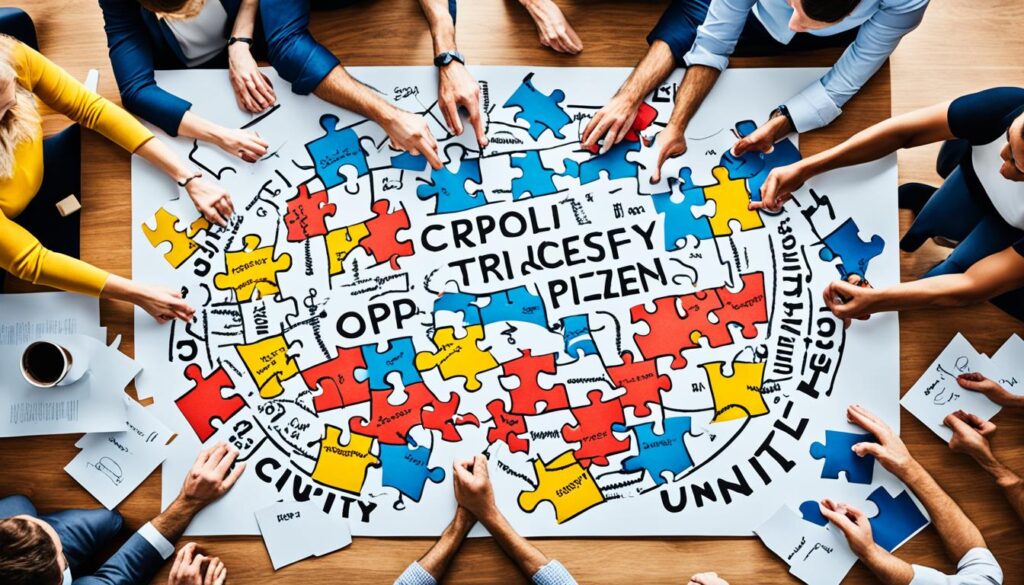Conflict resolution is key, both in social life and at work. Problems left unsolved cost US businesses a whopping $359 billion a year. I’ll discuss why resolving conflicts is so important and the good it brings.
Key Takeaways:
- Conflict resolution is essential for market stability and productivity.
- Unresolved conflict can have significant financial implications for businesses.
- Conflict resolution offers psychological benefits to individuals and organizations.
- Effective strategies and approaches can be used to resolve conflicts.
- By understanding conflict resolution, we can foster a harmonious work environment.
What Is Conflict Resolution & Why Is It Important?
Conflict resolution means finding a way to agree when people have different wants or needs. It’s crucial for keeping peace. If conflicts aren’t solved, they can harm our health and cause us to feel fearful, angry, or stressed. So, it’s key to deal with disagreements promptly and wisely.
Not resolving conflicts can hurt our bodies and minds. The tension from arguments can increase our blood pressure, weaken our immune system, and even lead to mental health problems. Knowing how to resolve conflicts helps us create places where working together is the norm, leading to better outcomes for everyone.
Conflict resolution matters for many reasons:
- It stops conflicts from getting worse and causing permanent harm.
- It helps us talk openly to find solutions that work for all involved.
- It encourages us to see things from others’ viewpoints, building understanding and compassion.
- It strengthens the bonds of trust, both in personal and work relationships.
- It teaches us about ourselves and how to grow from facing and solving issues with others.
- It makes our work environments positive and effective, boosting our job satisfaction and team spirit.
“The ultimate measure of a person is not where they stand in moments of comfort and convenience, but where they stand at times of challenge and controversy.” – Martin Luther King Jr.
The Psychological Benefits of Conflict Resolution
Handling conflicts well brings big benefits to our mental and emotional health. Effectively solved disagreements help us in many ways:
- Stress reduction: We feel lighter and more at peace when we’ve cleared up conflicts.
- Improved self-esteem: Sorting out problems makes us feel good about ourselves and our growth.
- Increased self-efficacy: Knowing we can fix things boosts our confidence for future challenges.
- Better relationships: It boosts friendship and trust by making us better at talking and listening.
- Increased energy: Fixing issues gives us back the energy we spend worrying, helping us focus on better things.
Recognizing the value of solving conflicts improves both personal and group life. It makes workplaces healthier and more successful. With the right skills, we can turn conflicts into opportunities to grow and succeed.
| Conflict Resolution Benefits: | |
|---|---|
| Stress reduction | Conflict resolution alleviates mental and emotional strain. |
| Improved self-esteem | Successful conflict resolution boosts confidence and self-worth. |
| Increased self-efficacy | Resolving conflicts enhances belief in one’s ability to handle future challenges. |
| Better relationships | Conflict resolution strengthens communication, understanding, and trust. |
| Increased energy | Resolving conflicts frees up mental and emotional energy for productive pursuits. |
5 Psychological Benefits of Conflict Resolution
Conflict resolution not only stops fights but brings many psychological perks. It helps people feel better mentally. It also makes relationships stronger. Here are some ways it helps:
1. Stress Reduction
Disputes can really stress us out. They make us feel bad and can harm our health. But, solving a conflict can lower our stress. It helps us feel calm and at peace. This way, we let go of things that bother us and find balance.
2. Improved Self-Esteem
Conflicts can make us feel small and unsure about ourselves. Yet, handling them well can make us feel good again. It makes us see ourselves as strong and sure. This boosts our self-esteem and helps us feel more confident.
3. Increased Self-Efficacy
Solving conflicts helps us stand up for ourselves. It makes us believe in our skills to face tough times. This trust goes beyond solving fights. It affects how we do at work and with friends. We become more self-assured.
4. Better Relationships
Fights that aren’t solved hurt relationships. They make people feel bad and keep apart. But, fixing these issues makes relationships stronger. It means talking openly, sharing feelings, and understanding each other. This builds trust and friendship.
5. Increased Energy
Arguments can be tiring, making us feel down and lazy. But, solving them gives us a boost of energy. It takes the weight off our shoulders, freeing us. This way, we focus on good things. We work better and feel more satisfied.
Solving conflicts helps everyone grow and work better together. It makes the world a nicer place.
| Psychological Benefits of Conflict Resolution |
|---|
| Stress Reduction |
| Improved Self-Esteem |
| Increased Self-Efficacy |
| Better Relationships |
| Increased Energy |
Strategies for Conflict Resolution – Skills and Approaches
To solve conflicts well, we need to use important skills and methods. Such as:
- Self-awareness: It’s important to know your own emotions, what makes you upset, and your own views. When we can handle our own reactions, we approach conflicts clearly and with understanding.
- Self-control: Staying calm and under control stops fights from getting worse. By keeping our feelings and reactions in check, we can talk it out and find solutions together.
- Assertive communication: Telling what we need in a strong but respectful way is key. Being clear and honest helps everyone understand each other better and work together.
- Collaboration: When we work as a team for a solution that helps each person, it’s a win for all. Finding common ground and common goals helps solve conflicts better.
- Problem-solving: Looking at the conflict from different angles and finding new ways to fix it is helpful. A step-by-step process guides us through complicated issues and helps us find the best solutions.
- Empathy: Hearing and feeling for the other side’s view and emotions helps a lot. It builds trust, understanding, and a positive atmosphere for solving conflicts.
- Active listening: Just listening well, without jumping in, helps everyone understand each other’s point of view. This can cool down situations and pave the way for real talks.
There are two popular ways to end conflicts: using a conflict resolution model and solving problems together:
The conflict resolution method means talking openly, taking feedback, and finding an agreement everyone can live with. It aims to fix issues at the root to stop future conflicts.
Collaborative problem-solving is all about setting common goals, finding creative answers, and working together on them. This way supports teamwork and shared efforts to solve the problem.
By using these methods at work, companies can make their place better. This way, they build stronger bonds among employees, which can lead to better work outcomes.
Conclusion
Conflict resolution is vital for stable markets and good relationships. It’s crucial to know how to resolve conflicts. This helps both people and groups work better together.
Working out problems saves companies a lot of money each year. It also helps people feel less stress and better about themselves. They also get along with others more and feel happier and healthier.
There are many skills for solving conflicts. These include understanding yourself better, talking clearly, working together, and solving problems. Also, it’s important to listen to each other and be empathetic.
If companies focus on these skills and create a culture of good communication, things will go smoothly. This approach helps everyone do better and be happy at work and in life. Learning about conflict resolution can make a big difference for everyone.
FAQ
What is conflict resolution?
Why is conflict resolution important?
What are the psychological benefits of conflict resolution?
What skills and approaches can be utilized for conflict resolution?
What are popular approaches for conflict resolution?
How can conflict resolution contribute to a healthier work environment?
Source Links
- https://positivepsychology.com/conflict-resolution-in-the-workplace/
- https://www.state.gov/united-states-strategy-to-prevent-conflict-and-promote-stability/
- https://chemonics.com/blog/why-conflict-analysis-matters-for-economic-development/
Disclaimer
All information on this website is of a general nature. The information is not adapted to conditions that are specific to your person or entity. The information provided can not be considered as personal, professional or legal advice or investment advice to the user.
This website and all information is intended for educational purposes only and does not give financial advice. Signal Mastermind Signals is not a service to provide legal and financial advice; any information provided here is only the personal opinion of the author (not advice or financial advice in any sense, and in the sense of any act, ordinance or law of any country) and must not be used for financial activities. Signal Mastermind Signals does not offer, operate or provide financial, brokerage, commercial or investment services and is not a financial advisor. Rather, Signal Mastermind Signals is an educational site and a platform for exchanging Forex information. Whenever information is disclosed, whether express or implied, about profit or revenue, it is not a guarantee. No method or trading system ensures that it will generate a profit, so always remember that trade can lead to a loss. Trading responsibility, whether resulting in profits or losses, is yours and you must agree not to hold Signal Mastermind Signals or other information providers that are responsible in any way whatsoever. The use of the system means that the user accepts Disclaimer and Terms of Use.
Signal Mastermind Signals is not represented as a registered investment consultant or brokerage dealer nor offers to buy or sell any of the financial instruments mentioned in the service offered.
While Signal Mastermind Signals believes that the content provided is accurate, there are no explicit or implied warranties of accuracy. The information provided is believed to be reliable; Signal Mastermind Signals does not guarantee the accuracy or completeness of the information provided. Third parties refer to Signal Mastermind Signals to provide technology and information if a third party fails, and then there is a risk that the information may be delayed or not delivered at all.
All information and comments contained on this website, including but not limited to, opinions, analyzes, news, prices, research, and general, do not constitute investment advice or an invitation to buy or sell any type of instrument. Signal Mastermind Signals assumes no responsibility for any loss or damage that may result, directly or indirectly, from the use or dependence on such information.
All information contained on this web site is a personal opinion or belief of the author. None of these data is a recommendation or financial advice in any sense, also within the meaning of any commercial act or law. Writers, publishers and affiliates of Signal Mastermind Signals are not responsible for your trading in any way.
The information and opinions contained in the site are provided for information only and for educational reasons, should never be considered as direct or indirect advice to open a trading account and / or invest money in Forex trading with any Forex company . Signal Mastermind Signals assumes no responsibility for any decisions taken by the user to create a merchant account with any of the brokers listed on this website. Anyone who decides to set up a trading account or use the services, free of charge or paid, to any of the Broker companies mentioned on this website, bears full responsibility for their actions.
Any institution that offers a service and is listed on this website, including forex brokers, financial companies and other institutions, is present only for informational purposes. All ratings, ratings, banners, reviews, or other information found for any of the above-mentioned institutions are provided in a strictly objective manner and according to the best possible reflection of the materials on the official website of the company.
Forex/CFD trading is potentially high risk and may not be suitable for all investors. The high level of leverage can work both for and against traders. Before each Forex/CFD investment, you should carefully consider your goals, past experience and risk level. The opinions and data contained on this site should not be considered as suggestions or advice for the sale or purchase of currency or other instruments. Past results do not show or guarantee future results.
Neither Signal Mastermind Signals nor its affiliates ensure the accuracy of the content provided on this Site. You explicitly agree that viewing, visiting or using this website is at your own risk.



